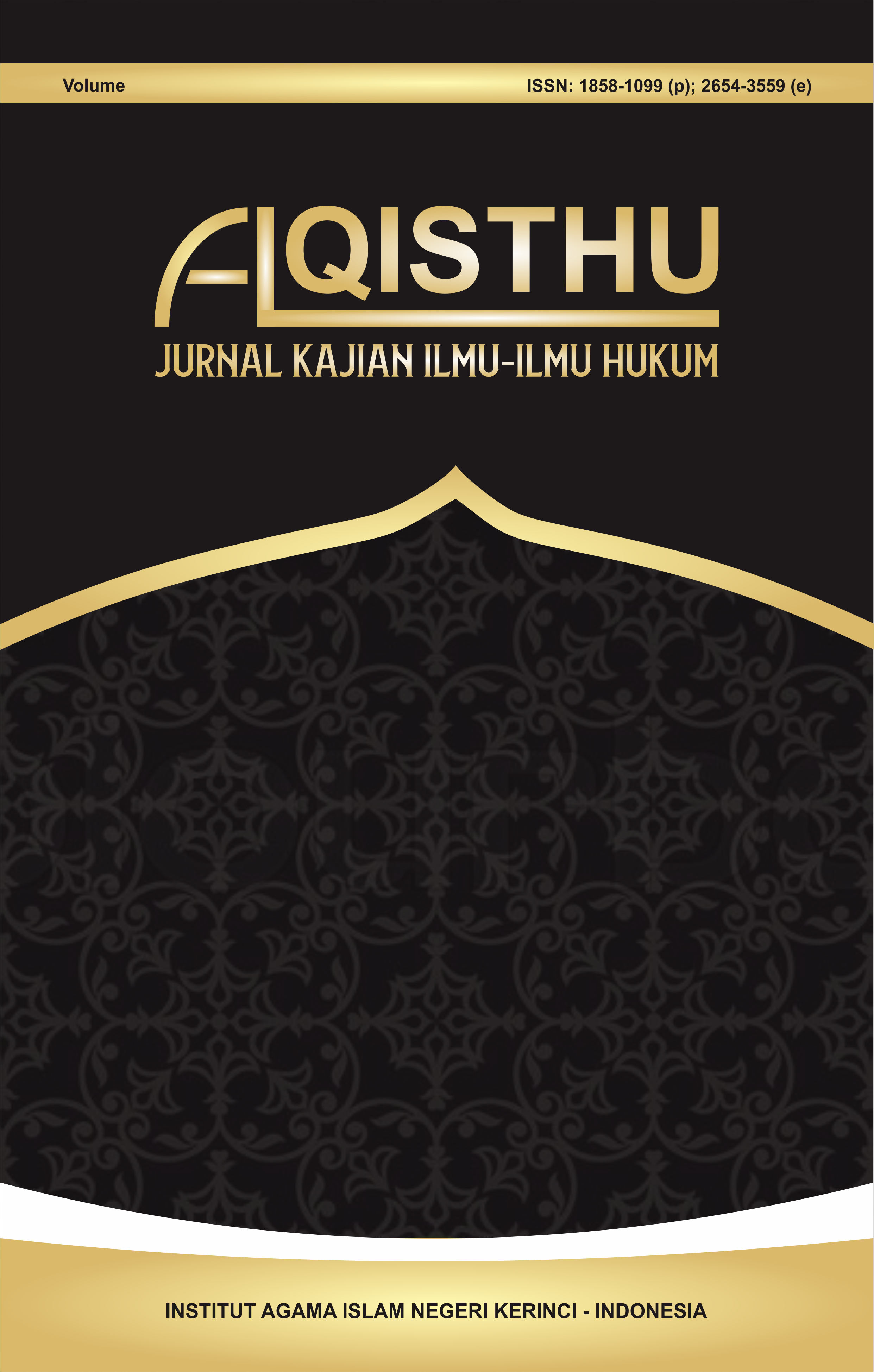Moral Politik Hukum Islam: Menyeimbangkan Hak Asasi Manusia dan Konservasi Lingkungan
Abstract
The global dialogue on balancing economic development, human rights protection, and environmental preservation necessitates contributions from religions with their universal values. This article elucidates the role of Islamic law in maintaining the balance between human rights and environmental sustainability through political practices and policies in Indonesia. This study employs a descriptive-analytical method with a qualitative approach. Data collection is conducted through literature review and analyzed using content analysis. The findings of this research indicate that the concepts of maslahah (public interest) and maqasid al-shariah (objectives of Islamic law) have played a crucial role in providing fundamental principles for various sustainable policies. Islamic legal politics, through the principles of tawazun (balance) and avoiding harm, have fostered a restraint from excessive exploitation of natural resources to maintain ecological balance. The principles of maslahah and maqasid al-shariah offer a strong ethical and moral foundation for sustainable policies and support global efforts towards environmental sustainability and social welfare.
Downloads
References
Abidin, A. Z., & Muhammad, F. (2020). TAFSIR EKOLOGIS DAN PROBLEMATIKA LINGKUNGAN. QOF, 4(No. 1), 1–18. https://doi.org/10.30762/qof.v4i1.1990
Akib, M. (2014). Pergeseran Paradigma Penegakan Hukum Lingkungan: dari Mekanistik-Reduksionis ke Holistik-Ekologi. Masalah - Masalah Hukum, 43(No. 1), 125–131. https://doi.org/https://doi.org/10.14710/mmh.43.1.2014.125-131
Ali., A. S. (2008). Pergolakan di Jantung Tradisi : NU yang Saya Amati. LP3S.
Aung, T. S. (2016). Islam and environmental protection: The awareness of the Malaysian muslim community. Al-Shajarah: Journal of the International Institute of Islamic Thought and Civilization (ISTAC), 21(No. 2).
Britannica. (2020). deontological ethics | Definition, Meaning, Examples, & Facts | Britannica. Encyclopedia Britannica. https://www.britannica.com/topic/deontological-ethics
Britannica. (2023). teleological ethics. Editors of Encyclopaedia (2023, June 8). https://www.britannica.com/topic/teleological-ethics
Chan, A., & Islam, M. S. (2015). State, religion, and environmentalism: fostering social cohesion and environmental protection in Singapore. Environmental Sociology, 1(No. 3), 177–189. https://doi.org/10.1080/23251042.2015.1045263
Dariah, A. R., Salleh, M. S., & Shafiai, H. M. (2016). A New Approach for Sustainable Development Goals in Islamic Perspective. Procedia - Social and Behavioral Sciences, 159–166. https://doi.org/10.1016/j.sbspro.2016.05.001
Elfudllatsani, B., Isharyanto, & Riwanto, A. (2019). KAJIAN MENGENAI KEBEBASAN BERKUMPUL DAN BERSERIKAT PASAL 28E AYAT (3) UNDANG-UNDANG DASAR 1945 MELALUI ORGANISASI KEMASYARAKATAN KAITANNYA DENGAN TEORI KEDAULATAN RAKYAT DAN HAK ASASI MANUSIA. Jurnal Hukum Dan Pembangunan Ekonomi, 7(No. 1), 52–61. https://doi.org/10.20961/hpe.v7i1.29190
Firdaus, S. (2022). AL-QUR’AN DAN PEMBANGUNAN LINGKUNGAN BERKELANJUTAN DI INDONESIA: ANALISIS MAQASHID SYARIAH UNTUK PENCAPAIAN SDGs. Al-Mustashfa: Jurnal Penelitian Hukum Ekonomi Syariah, 7(No. 2), 120–138. https://doi.org/10.24235/jm.v7i2.11594
Gottlieb, R. S. (2008). You gonna be here long? Religion and sustainability. Worldviews: Environment, Culture, Religion, 12(No. 2-3), 163–178. https://doi.org/10.1163/156853508X359967
He, L., Shen, J., & Zhang, Y. (2018). Ecological vulnerability assessment for ecological conservation and environmental management. Journal of Environmental Management, 15(No. 206), 1115–1125. https://doi.org/10.1016/j.jenvman.2017.11.059
Jaelani, A., Setyawan, E., Aziz, A., Wahyuningsih, N., & Djuwita, D. (2020). Sustainable Event and Festival in Cirebon, Indonesia: in Islamic Marketing Perspective. Revista Rosa Dos Ventos - Turismo e Hospitalidade, 12(No. 4). https://doi.org/10.18226/21789061.v12i4p811
Kamil, S. (2021). Etika Islam: Kajian Etika Sosial dan Lingkungan Hidup. Prenada Media.
Kasri, N. S., Bouheraoua, S., & Mohamed Radzi, S. (2023). Maqasid al-Shariah and Sustainable Development Goals Convergence: An Assessment of Global Best Practices. In Islamic Finance, FinTech, and the Road to Sustainability. Palgrave Macmillan, Cham. https://doi.org/10.1007/978-3-031-13302-2_4
Kobayashi, M., Yoshiura, S., Sato, T., & Kaneko, N. (2015). Managing environmental risks and promoting sustainability, scientific advancement, and leadership development. In Sustainable Living with Environmental Risks. https://doi.org/10.1007/978-4-431-54804-1_1
Nasir, N. M., Nair, M. S., & Ahmed, P. K. (2022). ENVIRONMENTAL SUSTAINABILITY AND CONTEMPORARY ISLAMIC SOCIETY: A SHARIAH PERSPECTIVE. Asian Academy of Management Journal, 27(No. 2), 211–231. https://doi.org/10.21315/aamj2022.27.2.10
Nicinska, J. (2013). Religious environmental groups and global climate change politics in the United States and the United Kingdom: what motivates activism? [Rutgers University-Graduate School-Newark]. https://doi.org/https://doi.org/10.7282/T3CV4FQF
Peter Mahmud Marzuki. (2011). Penelitian Hukum. Kencana Prenada.
Soekanto, S., & Mamudji, S. (2006). Penelitian Hukum Normatif: Suatu Tinjauan Singkat. PT. Raja Grafindo.
Tomalin, E., Haustein, J., & Kidy, S. (2019). Religion and the Sustainable Development Goals. Review of Faith and International Affairs, 17(No. 2), 102–118. https://doi.org/10.1080/15570274.2019.1608664
Zayyadi, A. (2015). Sejarah Konstitusi Madinah Nabi Muhammad Saw (Analisis Piagam Madinah dan Relevansinya di Indonesia). Supremasi Hukum: Jurnal Kajian Ilmu Hukum, 4(No. 1). https://doi.org/10.14421/sh.v4i1.1976
Zulfikar, E. (2018). WAWASAN AL-QUR’AN TENTANG EKOLOGI. QOF, 2(No. 3), 113–132. https://doi.org/10.30762/qof.v2i2.578
Copyright (c) 2024 Nur Sulistiyaningsih, Bahar Elfudllatsani

This work is licensed under a Creative Commons Attribution 4.0 International License.















